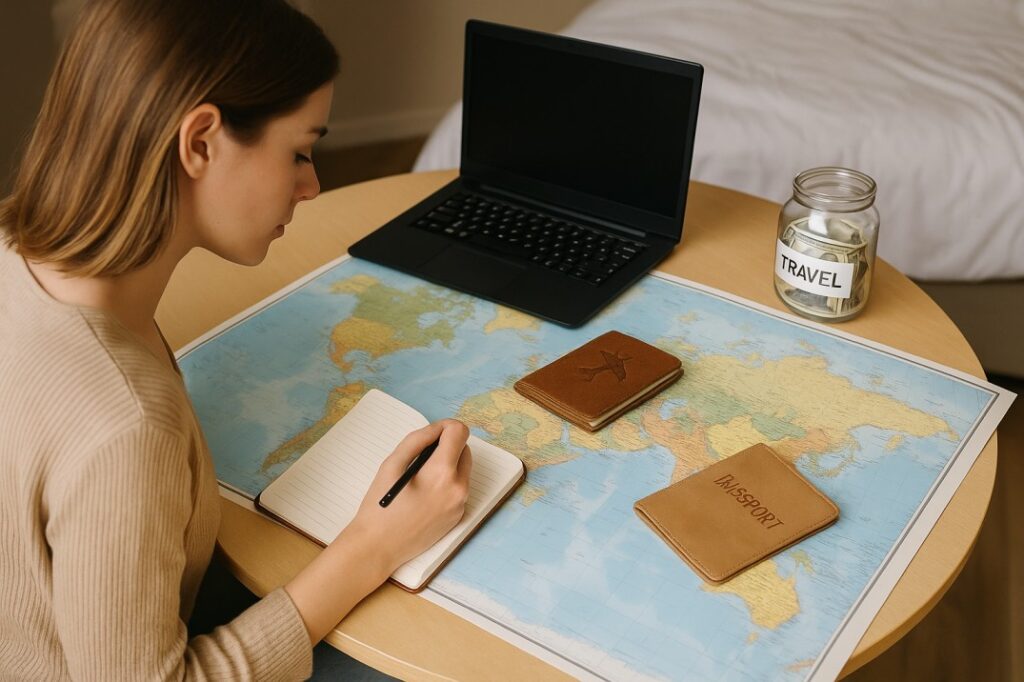For millions, exploring and traveling the world is a cherished dream. The idea of exploring new cultures, tasting exotic cuisines, meeting people from different walks of life, and experiencing diverse landscapes is undeniably exciting. But for many, the question remains—how to travel the world affordably, safely, and sustainably?
Whether you’re planning a gap year, a long-term backpacking trip, or simply want to tick off destinations from your bucket list, this complete guide will provide you with practical tips, practical strategies and insights to turn your dream of traveling the world into reality.
Why Travel the World?
Before we dive into the “how,” let’s look at why so many people are drawn to global exploration.
1. Exposure to New Cultures
Traveling the world allows you to fully immerse yourself in new cultures, languages, cuisines, and traditions. This cultural exchange builds understanding, appreciation, and respect for diversity while enriching your personal worldview.
2. Personal Growth
When you travel internationally, you step outside your comfort zone, which challenges you to adapt, solve problems, and embrace new experiences. Facing these challenges strengthens resilience, boosts confidence, fosters independence, and develops adaptability that lasts a lifetime.
3. Lifelong Memories
Travel offers unforgettable moments like seeing the Northern Lights, exploring the Great Wall of China, or hiking Machu Picchu. These once-in-a-lifetime experiences create cherished memories that stay with you forever.
4. Networking and Friendships
Travel connects you with people worldwide, offering opportunities to build genuine friendships across cultures. These relationships enrich your journey, expand your social network, and often lead to valuable personal or professional opportunities.
5. A New Perspective
Exploring the world reshapes your outlook on life by exposing you to different lifestyles, challenges, and values. It broadens your understanding of humanity, deepens empathy, and encourages gratitude for everyday experiences.
How to Travel the World: Step-by-Step Guide

1. Define Your Purpose and Goals
Ask yourself: Why do I want to travel the world? Is it for adventure, cultural experiences, personal growth, career opportunities, or simply to create lifelong memories that enrich my journey?
- Do you want adventure?
- To learn new skills?
- To experience cultures?
- To work while traveling?
Your goals will shape your travel style, destinations, and budget.
2. Create a Travel Budget
Budgeting is absolutely essential when planning global travel because it helps you manage expenses, allocate funds wisely, avoid financial stress, and ensure you can explore the world without running out of money.
When I planned my first solo trip, I underestimated food and local transport costs. After that experience, I always keep a buffer of at least 20% extra in my travel budget to avoid last-minute stress.
Tips for Saving Money:
- Start a dedicated travel savings account.
- Cut down unnecessary expenses.
- Use apps to track spending.
- Consider part-time jobs or side hustles for extra income.
Average Costs to Consider:
- Flights: Airfare can be the largest expense in world travel, but booking early, using budget airlines, or points can reduce costs significantly.
- Accommodation: From hostels to luxury hotels, accommodation costs vary. Staying in dorms, guesthouses, or work exchanges can make lodging affordable worldwide.
- Food: Food expenses differ by country. Eating at local markets or street food stalls is cheaper, while restaurants and tourist spots often increase costs.
- Transportation: Getting around includes buses, trains, taxis, or rideshares. Public transport and walking save money, while car rentals or flights cost more.
- Activities: Tours, excursions, and attractions can add up. Opting for free walking tours, hiking adventures, or exploring landmarks on your own is an excellent way to reduce activity expenses while still enjoying memorable experiences.
- Insurance: Travel insurance protects against medical emergencies, theft, and cancellations. Although often overlooked, travel insurance offers peace of mind and essential financial protection wherever you are in the world.
- Emergency funds: Unexpected expenses like medical bills, lost belongings, or urgent travel changes require backup funds to ensure safety and stress-free world travel.
3. Choose Your Destinations
Decide which countries or continents you want to visit by considering your budget, personal interests, travel goals, weather, and visa requirements, ensuring each destination aligns with your overall journey plan.
Factors to Consider:
- Budget (Asia is cheaper than Europe)
- Weather and seasonality
- Visa requirements
- Safety and health risks
- Language barriers
Pro Tip: Start with budget-friendly regions like Southeast Asia, South America, or Eastern Europe.
4. Plan Your Itinerary
While spontaneity makes travel exciting and adventurous, having a rough itinerary helps you stay organized, manage time better, and ensure you don’t miss important destinations, events, or cultural experiences along the way.
I still remember my first backpacking trip where I overbooked everything and ended up rushing through destinations. Later I learned that leaving space for flexibility makes travel much more enjoyable.
- Pick 2–3 anchor destinations.
- Plan travel routes efficiently.
- Don’t overbook—allow flexibility.
- Research local festivals and events.
Tools to Use:
- Google Maps for routes
- Rome2Rio for transport options
- Skyscanner for flights
- Hostelworld for accommodation
5. Secure Travel Documents
- Passport: Ensure at least 6 months of validity.
- Visas: Research visa requirements early.
- Travel Insurance: Protects against medical emergencies, cancellations, or theft.
- Vaccinations: Stay updated on health requirements.
6. Pack Smart
Traveling light simplifies your journey by lowering stress, cutting baggage costs, and giving you the freedom to move more easily and comfortably across different destinations. A minimalist approach ensures convenience, flexibility, and efficiency throughout your journey.
Essentials to Include:
- Comfortable clothing (adapted to climates)
- Travel-sized toiletries
- First aid kit
- Universal adapter
- Travel documents and copies
- Portable charger
- Lightweight backpack
7. Find Affordable Accommodation
During one of my trips to Thailand, I stayed in hostels for under $8 a night and met fellow travelers from around the world. It was both budget-friendly and socially rewarding.
Options for every budget:
- Hostels: Cheap and social.
- Airbnb: Great for longer stays.
- Couchsurfing: Free stays with locals.
- Work Exchanges: Stay free in exchange for work (e.g., Workaway, WWOOF).
- Hotels/Guesthouses: Comfortable mid-range options.
8. Save Money on Food and Transport
Food Tips:
- Eat local street food.
- Shop at markets.
- Cook when possible.
- Avoid touristy restaurants.
Transport Tips:
- Use public transport.
- Walk or rent bicycles.
- Book night buses or trains to save on accommodation.
9. Work While You Travel
If you want to travel long-term, finding ways to work while on the road can fund your journey, providing steady income while allowing you to explore new destinations without financial strain.
A friend of mine taught English online while traveling in Europe. His earnings covered almost all his accommodation and food expenses, making long-term travel possible.
Options Include:
- Teaching English online
- Freelancing (writing, design, coding)
- Blogging or YouTube
- Seasonal jobs (fruit picking, bar work)
- Digital marketing or social media management
10. Stay Safe While Traveling
Safety is crucial when traveling the world because being prepared and aware protects you from scams, theft, and unexpected dangers, ensuring you enjoy your journey with confidence, peace of mind, and security.
Tips:
- Research local scams.
- Keep valuables secure.
- Avoid risky areas at night.
- Share your location with family.
- Trust your instincts.
Best Ways to Travel the World on a Budget

- Use budget airlines and book early.
- Travel during off-peak seasons.
- Use reward points or miles.
- Stay in shared dorms or do house-sitting.
- Volunteer in exchange for accommodation.
- Use overnight transport to save on hotels.
Sustainable and Responsible Travel
Learning how to travel the world isn’t just about personal enjoyment—it’s about respecting cultures and the environment.
Tips for Responsible Travel:
- Respect local traditions and dress codes.
- Avoid single-use plastics.
- Support local businesses.
- Choose eco-friendly accommodations.
- Leave no trace in natural spaces.
Overcoming Common Fears
- Fear of Running Out of Money: Plan ahead, work remotely, or travel to cheaper countries.
- Fear of Loneliness: Stay in hostels, join group tours, and connect with locals.
- Fear of Safety Issues: Do thorough research and follow safety tips.
- Fear of Language Barriers: Learn basic phrases, use translation apps.
Inspirational Stories of World Travelers
- Budget Backpacker: Lived on $30/day in Southeast Asia for a year.
- Digital Nomad: Worked online while traveling through Europe.
- Couple Travelers: Explored 50 countries by combining volunteering with work exchanges.
These stories show that with the right planning, anyone can figure out how to travel the world, regardless of budget or background.
Conclusion
Learning how to travel the world requires preparation, budgeting, and an adventurous mindset. From choosing destinations to packing smart, working while traveling, and staying safe, the right strategies make it achievable for anyone. Whether you want to backpack for a year or take extended trips in phases, the journey is possible.
The world is vast and beautiful—don’t wait for the “perfect time.” Start planning today, embrace the unknown, and you’ll discover that traveling the world is not just about places, but about people, growth, and unforgettable experiences.
FAQs: How to Travel the World
It depends on your style. Budget travelers can spend $20–$50/day in Asia, while Europe may cost $60–$120/day.
Yes! You can take sabbaticals, use remote work opportunities, or plan shorter trips across multiple years.
There’s no perfect age. Students, professionals, and retirees all travel. It’s more about mindset and planning than age.
Disclaimer: The travel tips in this article are for informational purposes only. Safety, visa rules, and costs vary by country. Always double-check details with official government websites, airlines, and travel providers before planning your trip.
Sources
- Skyscanner: https://www.skyscanner.com
- Hostelworld: https://www.hostelworld.com
- Rome2Rio: https://www.rome2rio.com
- Workaway: https://www.workaway.info
- World Nomads Insurance: https://www.worldnomads.com



